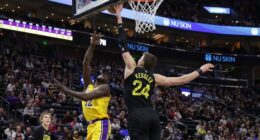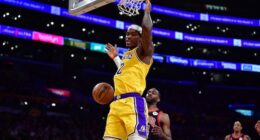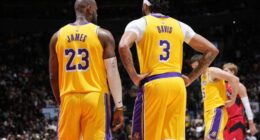
This isn’t that rare among superstars—although it’s harder to tolerate from the second-best player on a team, or anyone else who doesn’t guarantee your team goes deep in the playoffs annually.
Whatever Howard did in Orlando was treated as no big deal.
Did he send people running every which way, publicly second-guess coach Stan Van Gundy after Game 5 of the 2009 Eastern Conference Semi-Finals, after falling behind the Celtics, 3-2?
Unfortunately, the Magic had blown a 10-point lead in the last 5:39 of Game 5, while Howard went scoreless, and he couldn’t help but announcing, “When you have a dominant player, let him be dominant.”
Amazingly enough—or not, because everyone knew it was just Dwight being Dwight—Orlando came back and won Games 6 and 7.
The Lakers, of course, are more serious, so if Dwight lazes about, and then gets on one of them, even someone as nice and as soft-spoken as Steve Nash could go off on him in their Feb. 10 loss at Miami.
Lesson No. 4-Dwight was a rare combination, a major effort guy in games, but only marginally coachable otherwise.
The Lakers were flabbergasted to learn the great and mighty Dwight couldn’t run pick-and-rolls with the game’s best shooting point guard, Steve Nash.
As opposed to understanding fundamentals, Howard only knows how to run things as he did in Orlando.
On pick-and-rolls, he’s used “slipping” the screen–leaving just before the ball handler arrives to post up deep, with the opposing center unable to put his body on him.
Nash is used to getting a real screen so he can turn the corner, giving the defense the choice between letting him shoot (no good) or hitting Howard going to the hoop (no good, in theory).
Interestingly, Howard sets better screens for Kobe, either out of respect, or fear.
Lesson No. 4—Dwight’s demoralized.
I’m giving him the benefit of the doubt. I don’t believe he doesn’t care, even if that’s what it looks like.
In Orlando, he was a tireless worker, which, with his physical gifts, made him a force of nature.
Here, he’s not as awesome, or as tireless, as in this priceless play posted by Lakers Nation after the game, summing up his Laker career to date in one play.
Lesson No. 5—All that being the case, it’s obvious what the Lakers should do…
Drop back 15 yards and punt.
Not really, but this is as thorny as decisions get and all that’s riding on it is the Lakers’ future.
It’s obvious what the Lakes are going to do, play the season out, then try to sign Howard long-term.
I understand their position, based on the first principle of the NBA, as laid out by GM Mitch Kupchak: “It’s hard to get talent in this league.”
They’re right, at least as far as not trading him at the deadline.
After the season, if he says he doesn’t want to stay, he’ll commit himself to forgoing the extra year only they can give him, worth $30 million. Then they can trade him for, say, Josh Smith and Jeff Teague—which one GM told me the Hawks would give them.
I know I just wrote they should have traded him at the deadline. I didn’t think it through. They got that part right.
However, the Lakers also look like they intend to sign him, no matter what.
Personally, if he doesn’t show more than he has and things don’t improve with his teammates—notably Bryant—I’d hate to bet my entire future on him if there was any kind of alternative… like a Kobe-Pau-JSmoove-Teague nucleus that could play Mike D’Antoni’s offense.
What if he’s never Dwight of Orlando, physically?
What if he’s healthy but can’t adjust to adjust to this offense, as he has yet to this season?
What if he’s the Dwight of old but what if they continue to struggle next season and, now that he continues to alienate teammates—notably Bryant, whose contract runs out next season?
I don’t think it would be the way Kobe, who arrived in an ongoing snit with Shaq, dreamed his farewell would be, departing in an ongoing snit with Dwight.
Buckle your seatbelts, Laker fans. One way or another, you’re in for a long, wild ride.





